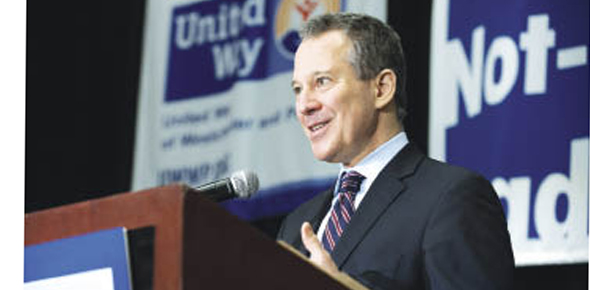

Schneiderman spoke at the 10th annual Not-For-Profit Leadership Summit on May 7 in Tarrytown, where earlier that day executives of several prominent local nonprofits launched the Nonprofit Association of Westchester, a coalition aimed at unifying the county”™s 5,700 such organizations as they seek regulatory relief.
The summit, which drew over 700 people, was hosted by the United Way of Westchester and Putnam and the Westchester Community Foundation at the Doubletree by Hilton hotel.
“I”™m trying to strike a slightly different theme for our office when it comes to our dealings with the nonprofit sector,” Schneiderman said. “Our laws have not been meaningfully updated in 40 years, and, ladies and gentlemen, it shows.”
The impact of nonprofits on New York”™s economy cannot be understated, Schneiderman said, adding that their role has become elevated in the wake of the recession with funding for social services cut across all levels of government.
Nationally, nonprofits account for just 6 percent of the total private sector workforce. But they collectively employ more than 18 percent of New York state”™s private sector labor force.
As of Oct. 2011, New York state had 22,000 active contracts with nonprofits to provide various services, totaling $16.8 billion.
“The truth of the matter is, you are the ones who work every day to deliver the services for which politicians often take credit, but they don”™t necessarily call attention to who”™s doing the work,” Schneiderman said.
Nonprofit leaders, however, say they are under the same financial pressures as state and local governments.
“I would say every nonprofit in this county is under economic stress,” said Catherine Marsh, executive director of the Westchester Community Foundation. “As government devolves, they have either subcontracted with the nonprofit world or they have not and nonprofits have had to pick up the pieces.”
The state”™s stringent regulatory requirements have only added to the rising costs experienced by nonprofit organizations.
A report by a committee of more than 30 nonprofit leaders from across the state that was released in February by Schneiderman”™s office highlights inefficiencies including delayed contract approvals and late payments from the state, and redundant documentation and auditing requirements imposed on nonprofit organizations.
In 2010 alone, late payments to nonprofit organizations from the state totaled $1.8 billion, and a review by the state Comptroller that year showed that 71 percent of contracts were not approved until after their start dates.
The Nonprofit Association of Westchester was formed as a means of addressing the latter barriers and inefficiencies, said Susan Wayne, chairman of the board of the new organization and president and CEO of Family Services of Westchester.
“The reason we feel that it is important and vital at this time to have such an alliance is because of the economic impact that we make in Westchester,” Wayne said. “We felt we needed to form some kind of an organization that provided more leverage and more of a voice.”
The group has filed for approval as a 501(c)3 and currently has 40 members, with a goal of recruiting at least 100 by the end of 2012.
Schneiderman, for his part, submitted a bill to the state Legislature in February including a number of proposals put forth by the nonprofit committee in its report.
They include making it easier for an organization to become a nonprofit, ensuring contracts are reviewed in a more timely manner and payments are made on schedule, creating an online database for the submission of reports and financial information, and increasing nonprofits”™ responsibilities to oversee financial audits.
- HOME
- E-EDITIONS
- MEMBERS/LEADS
- INDUSTRIES
- SMALL BUSINESS
- EVENTS
- GOOD THINGS
- PARTNER INSIGHTS
- ADVERTISE
- SUBSCRIBEACT NOW
- HOME
- E-EDITIONS
- MEMBERS/LEADS
- INDUSTRIES
- SMALL BUSINESS
- EVENTS
- GOOD THINGS
- PARTNER INSIGHTS
- ADVERTISE
- SUBSCRIBEACT NOW
Nonprofits applaud AG’s call for new partnership
0
Patrick Gallagher
Bio: Fairfield County Bureau Chief Staff Reporter Westchester County Business Journal Covers: Economy, energy, government, infrastructure and public works projects, law, media, technology Phone: (914) 694-3600, ext. 3017
Leave a Reply Cancel reply
World News
CNN WIRE — Judge decides not to drop charges against NYC mayor for now
By Lauren del Valle, CNN (CNN) — A federal judge has vacated the upcoming trial date for New York City...
No Result
View All Result
Latest News
Decadent Temptations: Guide to the Best Cupcakes in Westchester
Discover the best cupcakes in Westchester with our guide to top bakeries and unique cupcake offerings.



















